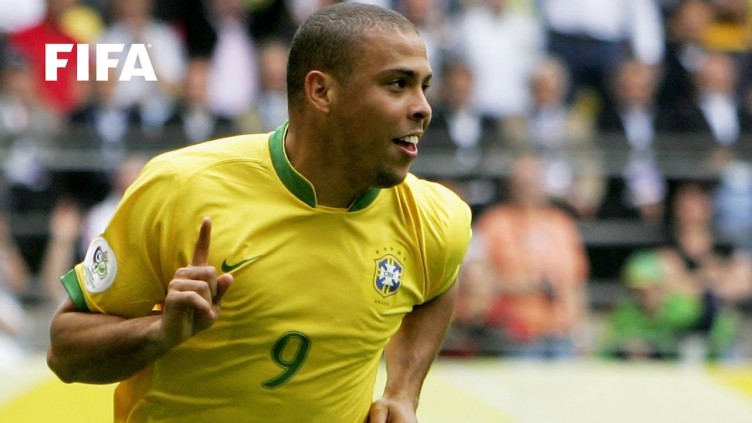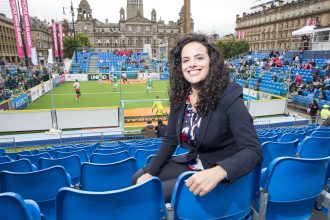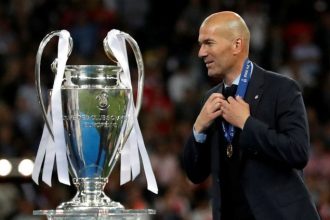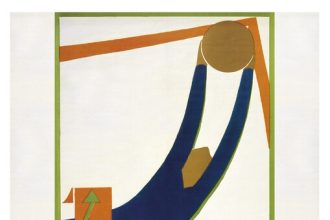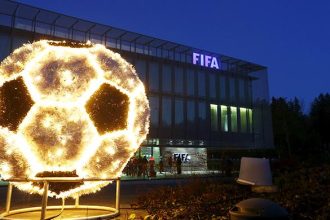Ronaldo Luís Nazário de Lima, commonly known as Ronaldo Nazário or Ronaldo, is hailed as one of the greatest footballers of all time. This article delves into the illustrious career of Ronaldo Nazário, highlighting his extraordinary talent, remarkable achievements, and enduring legacy as a true footballing phenomenon.
Born on September 18, 1976, in Rio de Janeiro, Brazil, Ronaldo showed immense potential from a young age. His natural ability to dribble past opponents with lightning speed and his clinical finishing prowess attracted attention early on. Ronaldo burst onto the global stage when he joined Cruzeiro in Brazil and later moved to Europe, where he played for renowned clubs such as Barcelona, Inter Milan, and Real Madrid.
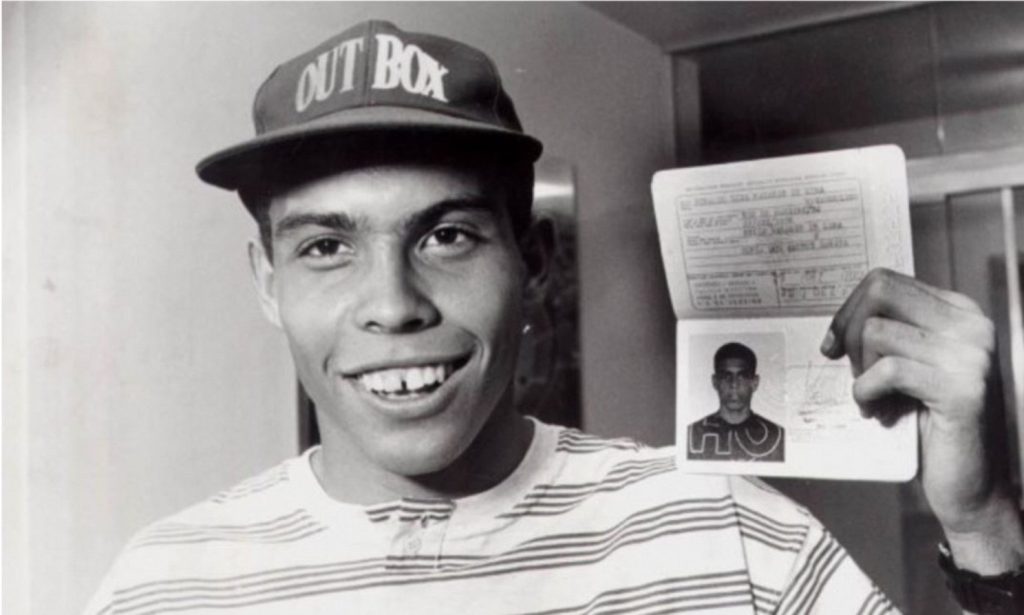
Ronaldo’s playing style was characterized by his explosive speed, impeccable ball control, and unparalleled finishing ability. His acceleration and agility allowed him to breeze past defenders with ease, leaving spectators awestruck by his breathtaking runs. Ronaldo possessed a lethal combination of power, technique, and intelligence, making him a nightmare for opposing defenses.
Ronaldo’s international career reached its zenith during the FIFA World Cup tournaments. He played a pivotal role in leading Brazil to victory in the 1994 World Cup, even though he was only a teenager at the time. Ronaldo’s crowning glory came in the 2002 World Cup, where his eight goals propelled Brazil to their fifth title. He won the Golden Boot as the tournament’s top scorer and was named the FIFA World Player of the Year three times (1996, 1997, and 2002).
Cruzeiro
Ronaldo quickly attracted attention from big clubs, and his agents rejected offers from Botafogo and São Paulo. He was turned down by Flamengo, the team he supported as a boy, after missing practice due to an inability to afford the fare for the hour-long bus ride. Jairzinho saw Ronaldo’s potential and helped get him a move to Cruzeiro. Ronaldo’s agents accepted an offer of €50,000 from the club, and he scored four goals on his youth team debut.
Three months after arriving at Cruzeiro, Ronaldo made his professional debut on 25 May 1993 against Caldense in the Minas Gerais State Championship. He came to national public attention on 7 November 1993, scoring five goals in the game against Bahia. His first senior goal came in a friendly during a tour of Portugal, scoring a goal against Belenenses and generally impressing new coach Carlos Alberto Silva, enough to become a first-team regular. During the tour, his performance against Porto impressed enough that they bid $500,000, which was turned down by club president César Masci. Upon returning from the tour, he scored 20 goals, with eight coming in the Supercopa Libertadores, including a hat-trick against Chilean side Colo-Colo in the first leg, and two in the second leg, before scoring a further three against Uruguayan team Nacional, resulting in him being the tournament’s top goalscorer. Ronaldo scored 44 goals in 47 games with Cruzeiro, leading them to their first Copa do Brasil in 1993, and the Minas Gerais State Championship in 1994.
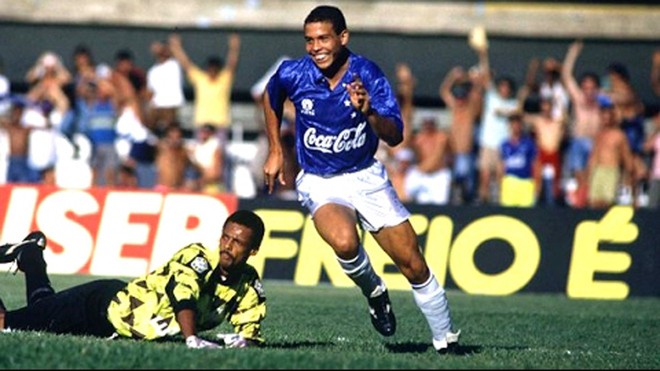
PSV
Ronaldo joined PSV after the 1994 World Cup. He was selected for the tournament despite being just 17 but did not play in any games. His Brazil teammate Romário having played for PSV from 1988 to 1993 advised Ronaldo to move to the club. On 28 August 1994, Ronaldo scored ten minutes into his debut against Vitesse and scored a brace on his home debut against Go Ahead Eagles. He scored 30 league goals in his first season in the Netherlands, which included seven braces and a hat-trick against Utrecht. After scoring a hat-trick in PSV’s game against Bayer Leverkusen in the 1994–95 UEFA Cup, Leverkusen striker and Germany World Cup winner Rudi Völler stated in a post-match press conference, “Never in my life have I seen an 18-year-old play in this way.” His dribbles from midfield caught the attention of many in the sport, with future Barcelona teammate Luis Enrique stating, “I’d seen him on television at PSV and thought ‘Wow’. Then he came to Barcelona. He’s the most spectacular player I’ve ever seen. He did things I’d never seen before. We’re now used to seeing Messi dribble past six players, but not then. Ronaldo was a beast.”
Nick Miller, match reporter for The Guardian, writes, “What’s striking about Ronaldo in that first year at PSV is how complete he looks, even as a skinny teenager. Everything that would come to define him – the lightning pace, the blurry stepovers, the implausible impression that he was faster with the ball than without it, even the exceptional upper-body strength – was all there.” Rob Smyth added, “In many ways, Ronaldo was the first PlayStation footballer. His stepover was a form of hypnosis, and his signature trick, the elastic, could certainly have come from a computer screen.” Ronaldo’s second season was marred by a knee injury which kept him out of most of the campaign, but he still averaged nearly a goal a game, scoring 19 goals in 21 appearances, including a UEFA Cup four-goal haul against Finnish side MyPa. With PSV, Ronaldo won the Dutch Cup in 1996 and he was Eredivisie’s top scorer in 1995. In his two seasons at the club, he scored 54 goals in 58 games.
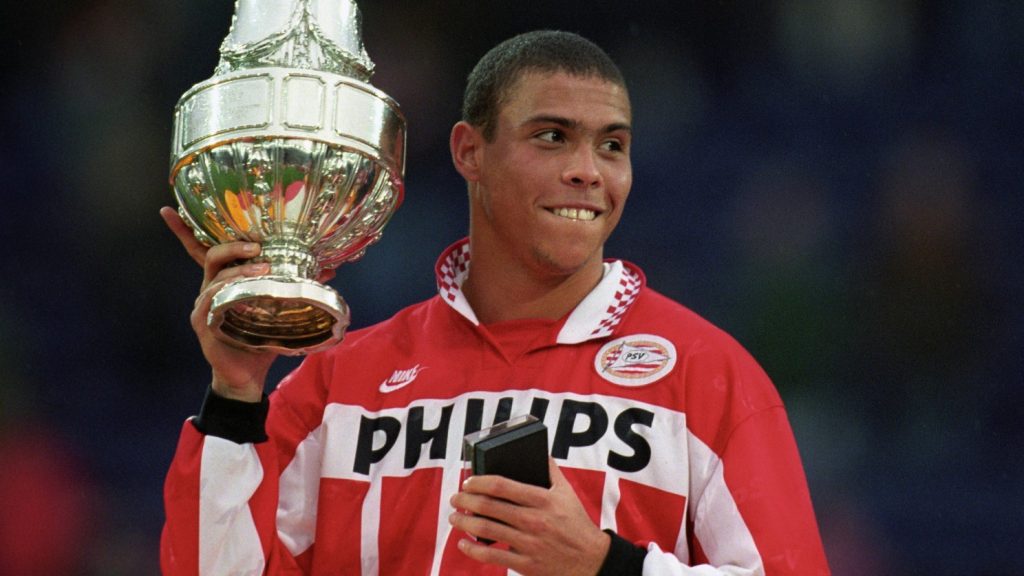
Barcelona
During his spell at PSV, Ronaldo attracted the attention of both Inter Milan and FC Barcelona. It was Barcelona that was willing to pay the then world record fee of $19.5 million, and he joined the club on 17 July 1996. According to manager Bobby Robson, he signed an eight-year contract and would play up front alone. Speaking to The New York Times regarding Ronaldo later that season, Robson said: “I don’t think I’ve ever seen a player at 20 have so much”.
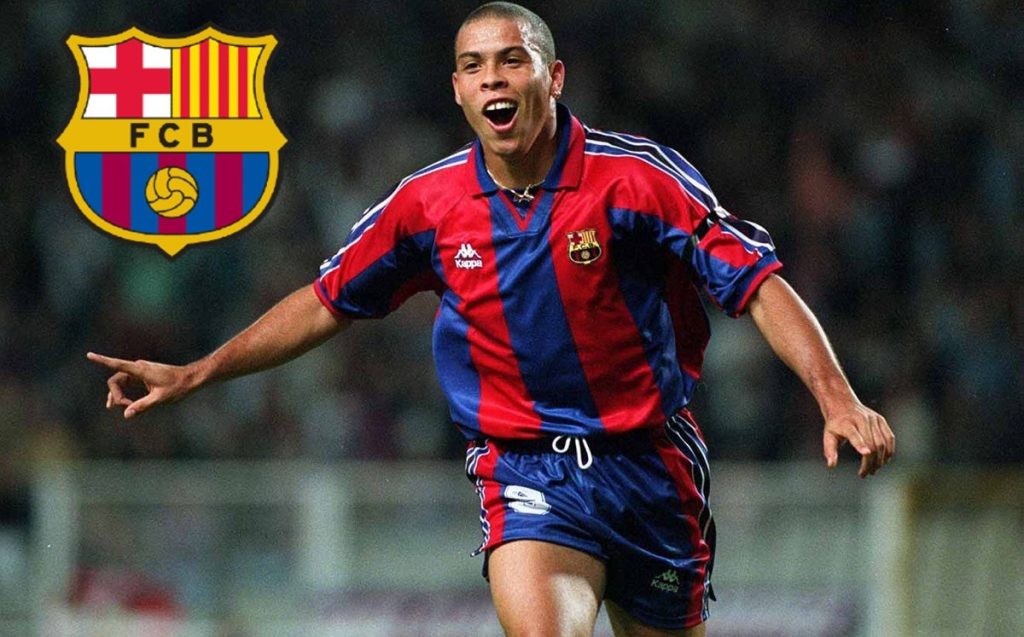
During the 1996–97 season, Ronaldo scored 47 goals in 49 games in all competitions, with his goal celebration invariably the same with his arms outstretched like the statue of Christ the Redeemer that watches over his native Rio de Janeiro. He helped Barcelona to the 1996–97 UEFA Cup Winners’ Cup title, capping the season with the winning goal in the final, and a win in the 1996 Supercopa de España. He also won La Liga’s top scorer award in 1997 with 34 goals in 37 games, and the European Golden Shoe. Until the 2008–09 season, Ronaldo remained the last player to score more than 30 goals in La Liga. Ronaldo was at his physical peak at Barcelona, and many of his 47 goals involved him rounding the goalkeeper before slotting the ball into the net. Óscar García, Ronaldo’s teammate that season, stated, “Back then, he was all fiber and muscle. He was a perfect physical specimen. Such incredible power matched to his technical skills could make him unstoppable.” José Mourinho, who worked as an interpreter at Barcelona, referred to Ronaldo as “the greatest player I have ever seen in my life”, adding, “I have no doubts. Ronaldo is the best my eyes have seen”, and in 2014 regarded him as the best player post-Diego Maradona.
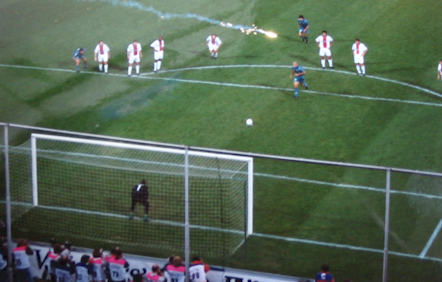
Arguably Ronaldo’s most memorable Barcelona goal was scored at SD Compostela on 11 October 1996; having received the ball inside his own half, he evaded a cynical tackle of the first opponent with a drag back, before running away from another and ran towards the goal, going past two more defenders in the box with close ball control, before finishing into the bottom corner of the net. The camera then cut to manager Robson who had got up off the bench and clasped his head in disbelief at what he had seen. The footage of the goal was later used in a Nike advert with a voiceover asking: “Imagine you asked God to be the best player in the world, and he listened to you”, and the goal was said to have been replayed 160 times on the main Spanish television channels in the 48 hours following the game. Halfway through the season, Barcelona agreed in principle to extend his contract to 2006, doubling his salary in the process. A hat-trick against Valencia, the third goal of which saw him dissect two Valencia defenders before striking the ball into the net, saw Barcelona fans waving white handkerchiefs as an expression of admiration for an exceptional performance. Sid Lowe of Sports Illustrated states, “That season Ronaldo was unstoppable. He was slim and powerful, skillful, fast, and deadly. He was ridiculously good.” At the end of 1996, aged 20, Ronaldo became the youngest player to win FIFA World Player of the Year.
Inter Milan
1997–1999: World record transfer and Ballon d’Or win
Ronaldo’s time at Barcelona lasted one season, as there were problems with the renegotiation of his contract. Barcelona thought there was an agreement in place, with Barcelona president Josep Lluís Núñez saying “He’s ours for life”, but when the parties reconvened the following day, the agreement collapsed, with Núñez admitting: “It’s all over, Ronaldo is going”. Speaking to ESPN, Ronaldo stated, “I had reached an agreement to renew my contract just a month before that season finished, but a week later the lawyer and the president of Barcelona agreed that that contract was absurd.” Paying the buyout clause fee in his contract, Inter Milan signed him in the summer of 1997 for a then world record fee of $27 million, making him the second player, after Diego Maradona, to break the world transfer record twice. He signed a five-year contract with the Italians and was unveiled to 4000 Inter fans at their training ground. His debut came on 27 July during the pre-season fixture against Manchester United. His competitive debut came on the opening day of the 1997–98 season against Brescia.
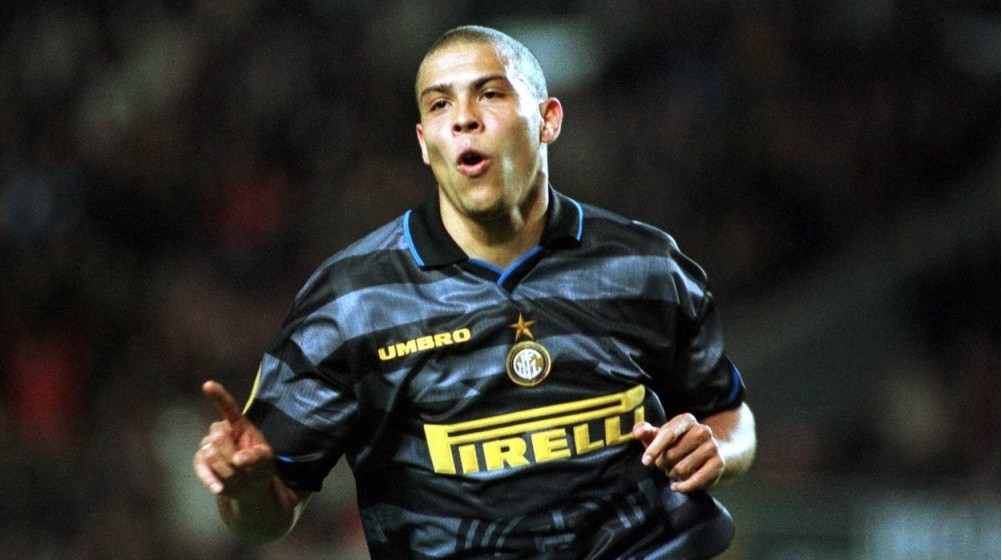
Ronaldo adapted to the Italian style of the game in his first season, finishing with 25 Serie A goals, and was named Serie A Footballer of the Year. Ronaldo started to develop into a complete forward. He began racking up assists, and became first-choice penalty taker, taking and scoring freekicks. Halfway through his first season he won FIFA World Player of the Year for the second time and collected the Ballon d’Or. During his time with Inter, he scored several goals against city rivals AC Milan in the Derby della Madonnina. Ronaldo and prolific Fiorentina striker Gabriel Batistuta were the two best strikers in Serie A, with their duels the most anticipated in Italy. Ronaldo’s goal celebrations often saw his Inter teammates congratulating him by kneeling down and pretending to shine his shoe. Ronaldo scored a trademark goal against Lazio in the 1998 UEFA Cup Final. Running through the defense to go one on one with Lazio goalkeeper Luca Marchegiani, Ronaldo feinted to go right then left, without touching the ball, leaving Marchegiani on his backside, before going right and slotting the ball into the net. His Inter teammate Youri Djorkaeff stated; “Ronaldo was phenomenal. He proved that he was a cut above the rest that season.” After the 1998 FIFA World Cup, where he was named player of the tournament, Ronaldo was widely regarded as the best striker in the world. By the end of the 1998–99 season, he was appointed Inter Milan captain.
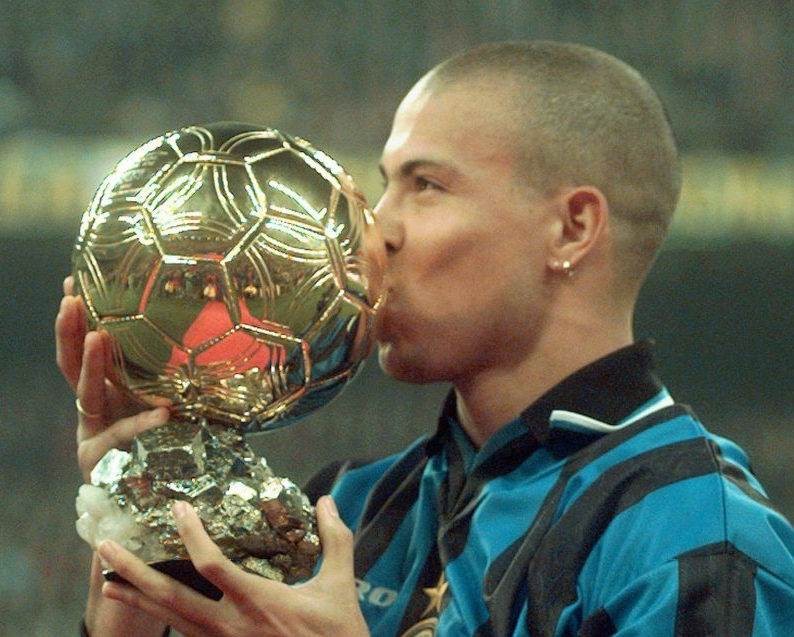
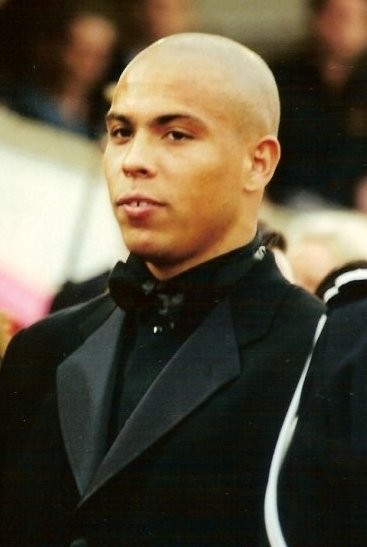
1999–2002: Recurring injury problems
After two seasons with Inter, A. C. Milan defender Paolo Maldini viewed Ronaldo and Diego Maradona as the two best players he ever faced, stating, “Ronaldo during his first two years at Inter was a phenomenon.” Inter had high hopes going into the 1999–2000 season with their attack including Ronaldo and Italian stars Roberto Baggio and Christian Vieri. However, on 21 November, during a Serie A match against Lecce, Ronaldo felt his knee buckle and was forced to limp off the field. A medical examination confirmed that the striker had ruptured a tendon in his knee and would require surgery. During his first comeback on 12 April 2000, he played only six minutes during the first leg of the Coppa Italia final against Lazio before suffering a complete rupture of the knee-cap tendons. Ronaldo’s physiotherapist Nilton Petrone stated, “his knee-cap actually exploded”, and called it “the worst football injury” he’s ever seen.
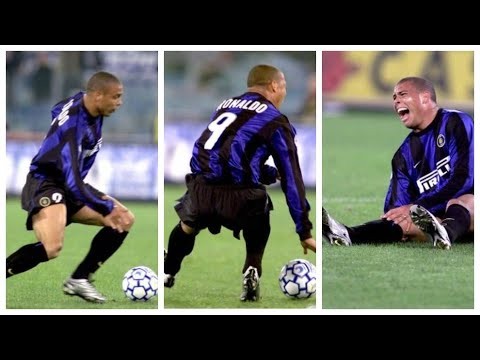
Ronaldo was forced to miss the entire 2000–01 season and much of the two seasons either side of it. Since his Inter teammate Javier Zanetti had replaced him as the team captain during his absence, he eventually inherited the captain’s armband in late 2001. After two operations and rehabilitation, Ronaldo came back for the 2002 World Cup, helping Brazil win their fifth World Cup title. Later in 2002, he won the FIFA World Player of the Year award for the third time and transferred from Inter to Real Madrid. Ronaldo was given his most recognizable nickname, Il Fenomeno, by the Italian press while playing there. His Inter teammate Djorkaeff stated, “When we were training, we would practically stop to watch him. It was extraordinary.” Prior to his November 1999 injury, Ronaldo had registered 42 goals in 58 Serie A games, in what was the hardest league to score in with the most advanced defensive strategies and the world’s best defenders. After five years he had played 99 games and scored 59 goals for Nerazzurri. Ronaldo’s performances at the club – especially the first two seasons before injury – saw him named among the four inaugural inductees into the Inter Milan Hall of Fame in 2018.
Real Madrid
2002–2005: Ballon d’Or win and La Liga championship
Having signed for Real Madrid for €46 million, his jersey sales broke all records on the first day. Ronaldo was part of the Galácticos era of global stars signed by the club every summer, which included Zinedine Zidane, Luís Figo, Roberto Carlos, and David Beckham. He was sidelined through injury until October 2002 which added to the fans anticipation. Ronaldo scored twice on his debut against Alavés, the first 61 seconds after coming on. That same reception was observed at the final game of the season against Athletic Bilbao, where Ronaldo scored to finish his first season with 23 league goals and seal La Liga title for 2003. He also won an Intercontinental Cup in 2002 and Supercopa de España in 2003, scoring in both finals.
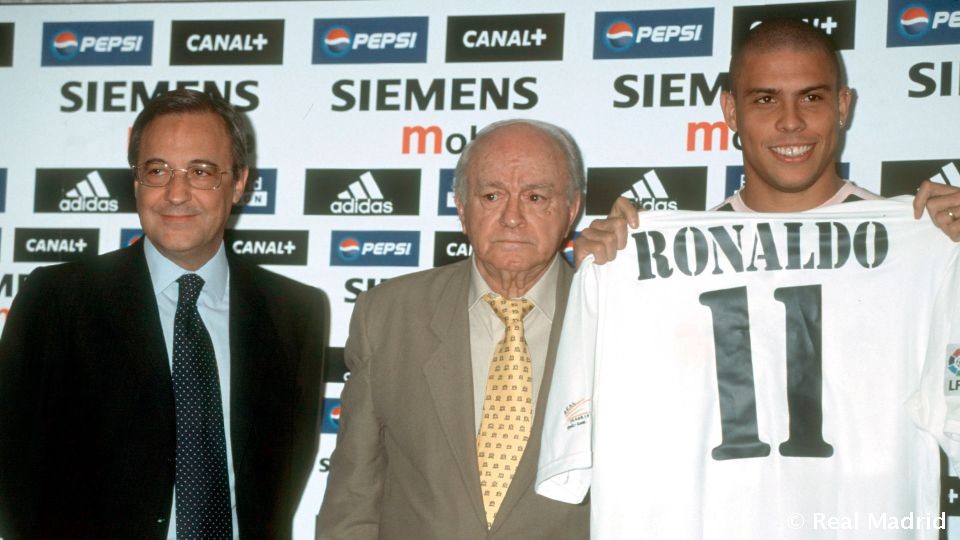
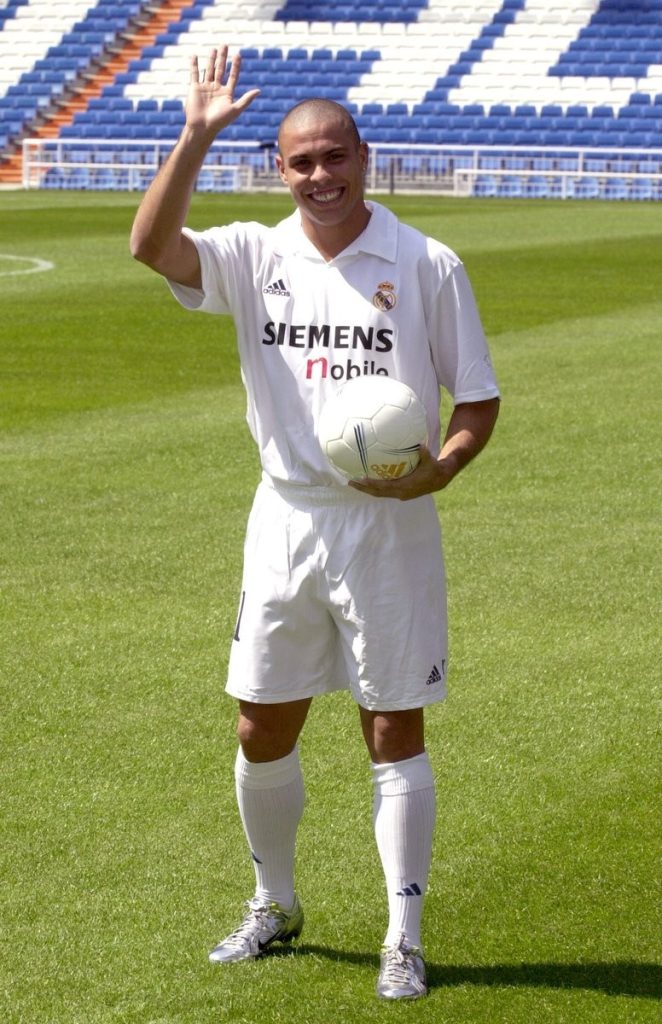
In the second leg of Real Madrid’s Champions League quarter-final, Ronaldo scored a hat-trick against Manchester United at Old Trafford, knocking the English team out of the competition. Completing his hat-trick with a swerving strike from 30 yards, Ronaldo was substituted off after 67 minutes and was given a standing ovation from both sets of fans. Reflecting on the ovation given to him by the opposition’s fans, Ronaldo stated that “it remains a very beautiful, very special moment”. Manchester United defender Wes Brown commented, “He was just unstoppable. A young Ronaldo [before a series of injuries] would have been even more dangerous, but it shows how good a player he was. Whenever he wanted to turn it on he could, on any stage, in any stadium”. Ronaldo scored in a 2–1 home win over Juventus in the first leg of the Champions League semi-finals, but injury crucially kept him out of most of the second leg defeat where Real was eliminated.
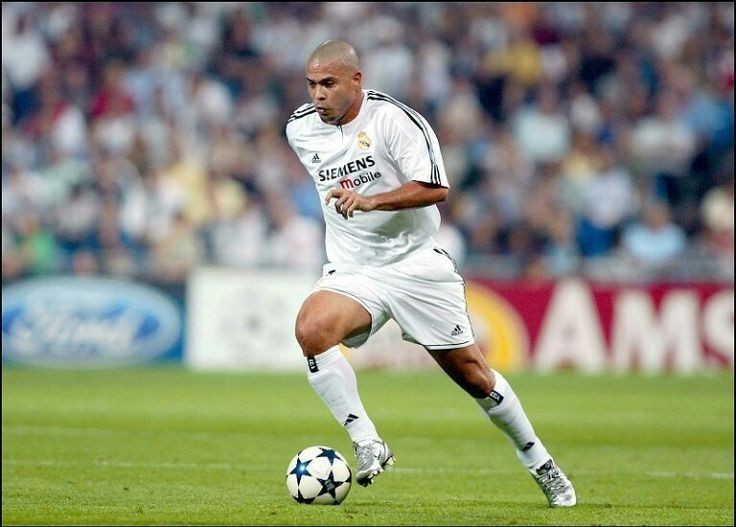
In the 2003–04 season, Madrid was on track to win the treble, until Ronaldo was injured towards the end of the season; they subsequently lost the Copa del Rey final, were knocked out of the UEFA Champions League quarter-finals to AS Monaco, and suffered a league form breakdown. During that second season at the club, Ronaldo scored one of the fastest goals in the club’s history when he netted after 15 seconds in a league match against Atlético Madrid at the Bernabéu on 3 December 2003. Three days later he helped to ensure Real’s first league victory over Barcelona at the Nou Camp in 20 years when he scored the second goal in a 2–1 victory over his former club. He finished the season as La Liga’s top scorer with 25 goals and received the Pichichi Trophy for a second time, despite Madrid losing the league title to Valencia.
2005–2007: Final two seasons
In his final two seasons at Real Madrid, Ronaldo missed a number of games with injuries and weight issues, and with the acquisition of Ruud van Nistelrooy in 2006, he grew further out of favor with the manager Fabio Capello. Speaking in 2017 on Ronaldo’s weight issues and lack of fitness at Madrid, in addition to his ability, Capello summed up the conflicting emotions he has with the Brazilian, “the most difficult player to handle was the best I coached: Ronaldo, il Fenomeno.”
In four and a half seasons at the club, Ronaldo scored over a century of goals, becoming the fifth foreigner at Madrid to achieve the feat after Argentine Alfredo Di Stéfano, Hungarian Ferenc Puskás, Mexican Hugo Sánchez and Chilean Iván Zamorano. Although the knee injuries before 2002 meant he “was robbed of the explosiveness of his early years” (FourFourTwo magazine) by the time he signed for Real Madrid, Ronaldo was named by Marca as a member of the “Best foreign eleven in Real Madrid’s history”.
While past his 1990s prime, Ronaldo still drew praise from his Madrid colleagues, with Zidane stating, “Without hesitation, Ronaldo is the best player I ever played with or against. He had such an ease with the ball. Every day I trained with him, I saw something different, something new, something beautiful.” Michael Owen, who joined Madrid in 2004, acknowledged that he never got the chance to play with Ronaldo in his prime when “he had absolute blistering speed and strength, mesmerizing foot speed, he was just a blur, he’d be that fast”, before adding, “even in training, he showed more than enough to convince me that I would have loved to play with him at his peak.”Teammates for six months, Van Nistelrooy said, “Ronaldo was the best natural talent I ever played with. His innate ability went beyond anything that I’d ever seen or played alongside.”
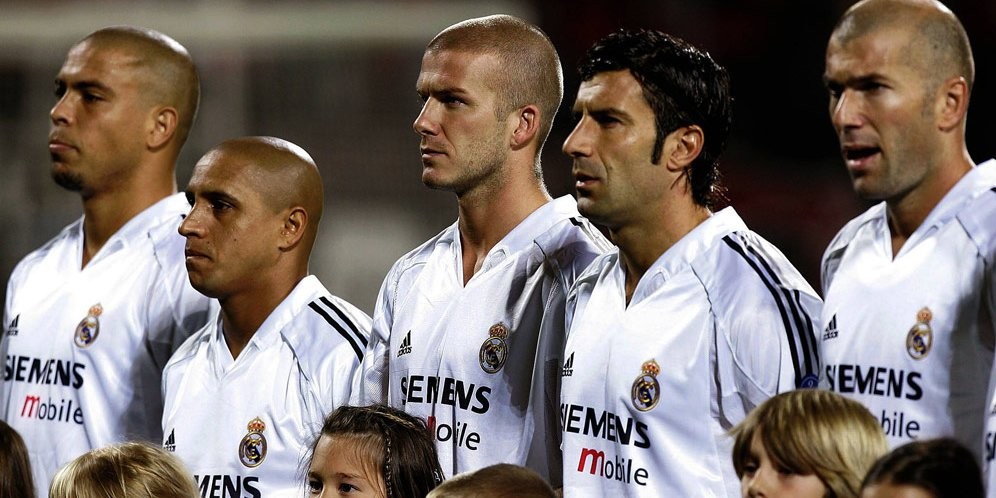
AC Milan
On 18 January 2007, it was reported that Ronaldo agreed terms with AC Milan for a transfer of €8.05 million. Departing Real Madrid has been the club’s leading goalscorer for all of his four full seasons, Ronaldo thanked everyone except Capello, “I would like to thank the fans who’ve supported me all the time and thank all the teammates that I’ve had here and all the coaches I’ve had – except one”. Capello, who dropped him due to weight issues, commented, “I wish him the best of luck in doing what he used to do which is being a great player.” On 25 January, Ronaldo flew from Madrid to Milan, with statements on the club’s website stating Ronaldo was in Milan for a medical, and that a meeting had been arranged with Real Madrid officials to discuss and finalize his transfer to the Milanese club. On 26 January, Ronaldo successfully completed his medical tests at the Milanello training complex under the supervision of club doctors, and the transfer was completed on 30 January. Wearing the number 99 jersey, he made his debut as a substitute on 11 February 2007 in the 2–1 victory over Livorno. In the next game at Siena, on 17 February, Ronaldo scored twice and assisted on a third goal in his first start for Milan, as they won 4–3. In his first season, Ronaldo scored seven goals in 14 appearances.
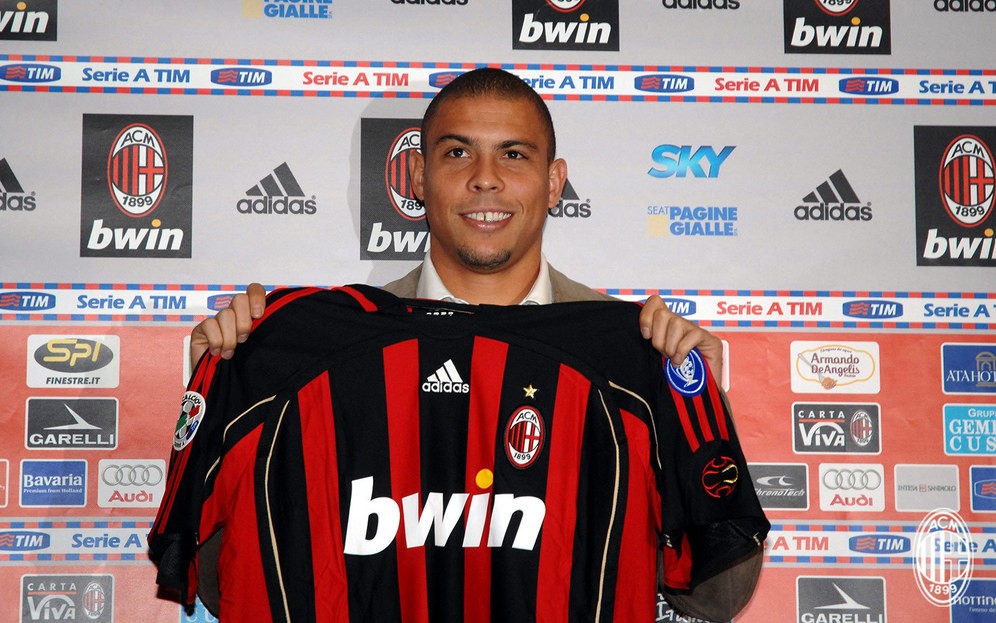
After his move to Milan, Ronaldo joined the list of the few players to have played for both Inter Milan and AC Milan in the Derby della Madonnina and is one of few players to have scored for both rival teams in the Milan derby game (for Inter in the 1998–99 season and for AC Milan in the 2006–07 season), the others being players such as Giuseppe Meazza, Zlatan Ibrahimović, Enrico Candiani, and Aldo Cevenini. Ronaldo is also one of the few players to have started for Real Madrid and FC Barcelona, which also boasts a heated rivalry. Ronaldo, however, has never transferred directly between rival clubs. Ronaldo only played 300-plus minutes in his second season at Milan due to recurring injury problems and weight issues. Ronaldo’s only goals in the 2007–08 season, besides his goal against Lecce in pre-season, came in a 5–2 victory against Napoli at the San Siro, where he scored an emotional double. It was also the first time Milan’s much-hyped attacking trio of Kaká, Alexandre Pato, and Ronaldo, known as Ka-Pa-Ro, played together.
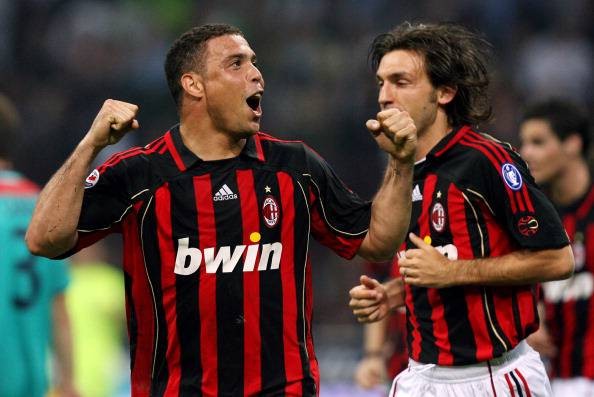
Despite tremendous success over the past decade, Ronaldo never won the UEFA Champions League in his club career. In 2019, FourFourTwo magazine named him the best player never to win the competition; in 2020, Sky Sports ranked him the second–best player (after Diego Maradona) never to win the Champions League or European Cup. Ronaldo stated, “I live football with a passion that doesn’t give me any peace for not winning the Champions League – it’s a trophy everyone would love to win.” In 2011, Paul Wilson wrote in The Guardian, “Ronaldo was unlucky in his timing or his choice of the club – for there is no doubt that at his very best he would have walked into any club in the world.” During the 2006–07 season, though Milan won the 2006–07 title, Ronaldo was cup-tied with Madrid and ineligible to take part. The closest that he came to Champions League success was in 2003 when he helped Real Madrid to the semi-finals, in which they lost to Juventus.
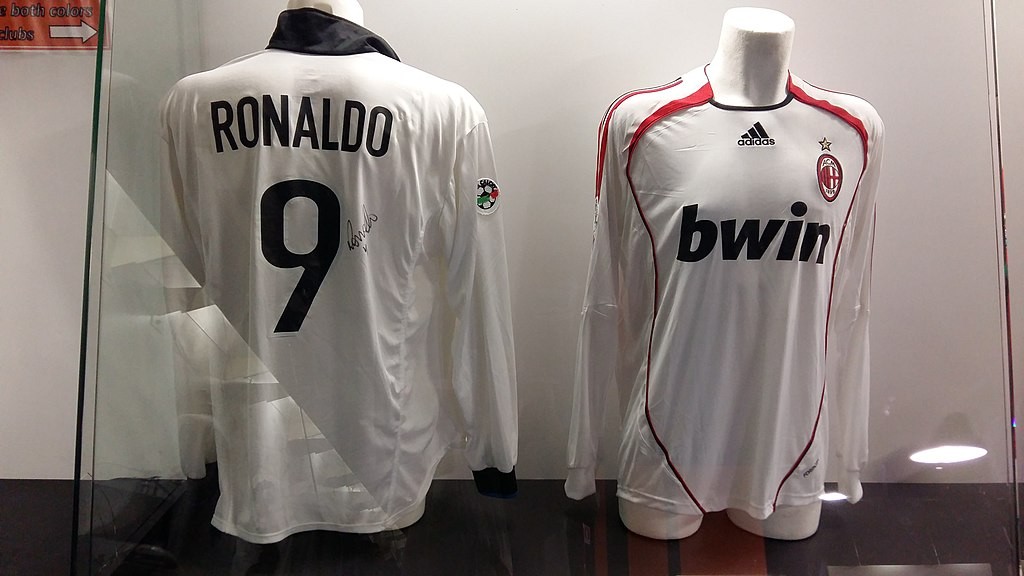
On 13 February 2008, Ronaldo suffered a severe season-ending knee injury while jumping for a cross in Milan’s 1–1 draw with Livorno, and was stretchered off and taken to a hospital. The club confirmed after the match that Ronaldo had ruptured the kneecap ligament in his left knee. It marked the third such occurrence of this injury, which he suffered twice to his right knee in 1999 and 2000. Teammate Clarence Seedorf stated, “My heart stopped beating because it was like watching a repeat of the injury he suffered playing for Inter Milan against Lazio [in 2000]. His reaction was the same.” Silvio Berlusconi told Italy’s RAI TV, “He fears for his career. I called him last evening and told him to believe in himself. He has enormous physical potential.” Ronaldo was released by Milan at the end of the season, as his contract expired and was not renewed.
Corinthians
2009–2010: Paulistão and Copa do Brasil
Ronaldo trained with Rio de Janeiro-based Brazilian club Flamengo during his recovery from knee surgery, and the club’s board of directors said that the doors were open for him to join. On 9 December, however, Ronaldo signed a one-year deal with Flamengo’s league rival Corinthians. The announcement received much publicity in the Brazilian press about his choice of Corinthians over Flamengo, since Ronaldo publicly declared himself a Flamengo fan. Rio-based sports newspaper Lance! called Ronaldo a “phenomenal traitor”, and some angry fans burned Ronaldo shirts outside the Flamengo headquarters. Ronaldo responded that playing for Corinthians was the only option open to him. “I understand perfectly, I’m openly a Flamengo fan. But I was training with Flamengo for four months and didn’t receive any offer. Corinthians made an offer that will let me continue my career.”
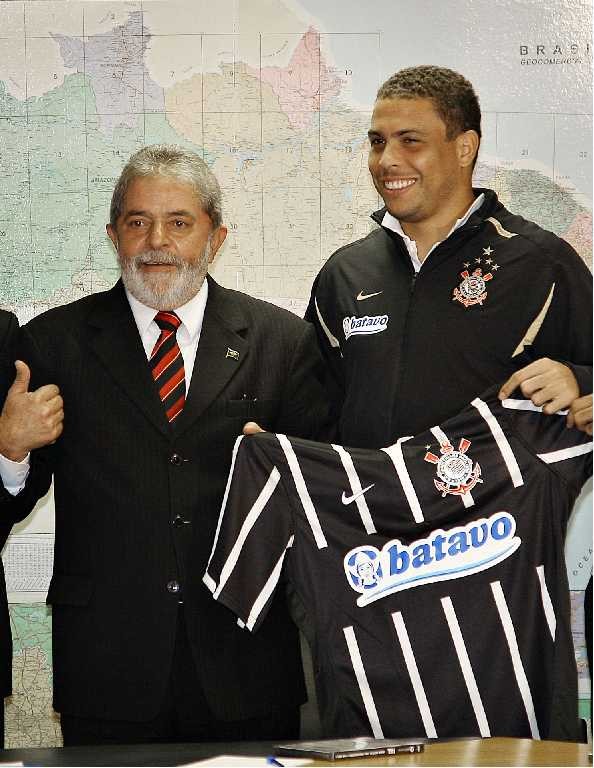
Ronaldo played his first match for Corinthians on 4 March 2009, a Copa do Brasil match against Itumbiara at Estádio Juscelino Kubitschek, in which he came as a substitute for Jorge Henrique. Ronaldo scored his first goal for Corinthians on 8 March 2009 in a Campeonato Paulista match against Palmeiras. Scoring eight goals in nine matches, his form led to calls for his return to the Brazil national team – nearly 70% of respondents in a poll for the O Globo newspaper voted that he should be reinstated, with the country’s president Lula also calling for his immediate return. He scored twice in a 3–1 win against local rivals Santos in the first leg of the state championship final, with Santos idol Pelé looking on from the stands. His second goal, a chip over the Santos goalkeeper from 30 yards out, sent the Corinthians fans into hysteria. Ultimately, he helped Corinthians win the Campeonato Paulista with 10 goals in 14 games.
Ronaldo scored in Corinthians 4–2 aggregate defeat of Internacional in the final of the 2009 Copa do Brasil, helping the club win the trophy for the third time (the second of his career), thus earning a spot in the Copa Libertadores 2010. Following an injury lay off he returned on 20 September in a match against Goiás, and a week later scored for Corinthians in a draw against São Paulo FC. He finished the 2009 Campeonato Brasileiro Série A with 12 goals in 20 matches.
Summer Olympics and Copa América
At the 1996 Summer Olympics in Atlanta, Ronaldo used the name Ronaldinho again, since center-back Ronaldo Guiaro, two years his senior, was one of his teammates. Brazil went on to win the bronze medal. Ronaldo also represented Brazil in the 1995 Copa América (finishing second) and won both the 1997 and the 1999 editions of the tournament. He was named player of the tournament in 1997, was the top scorer in 1999, and scored in the finals of both, against Bolivia in 1997 and Uruguay in 1999.[ He also took part in the friendly Tournoi de France in 1997, preceding the 1998 FIFA World Cup, scoring a goal as Brazil became runners-up. Ronaldo starred alongside Romário, dubbed the Ro-Ro attack, at the 1997 FIFA Confederations Cup, helping Brazil win their first-ever Confederations Cup title where he finished as the third-highest scorer with 4 goals, scoring a hat-trick against Australia in the final. On the combination of Ronaldo and Romário, Will Sharp writes: “…to the elation of all those fortunate enough to have watched them, they found themselves together, fated with the opportunity to forge one of the most outrageous offensive pairings the game has ever seen. Their partnership was brief but it was inexplicably brilliant.”
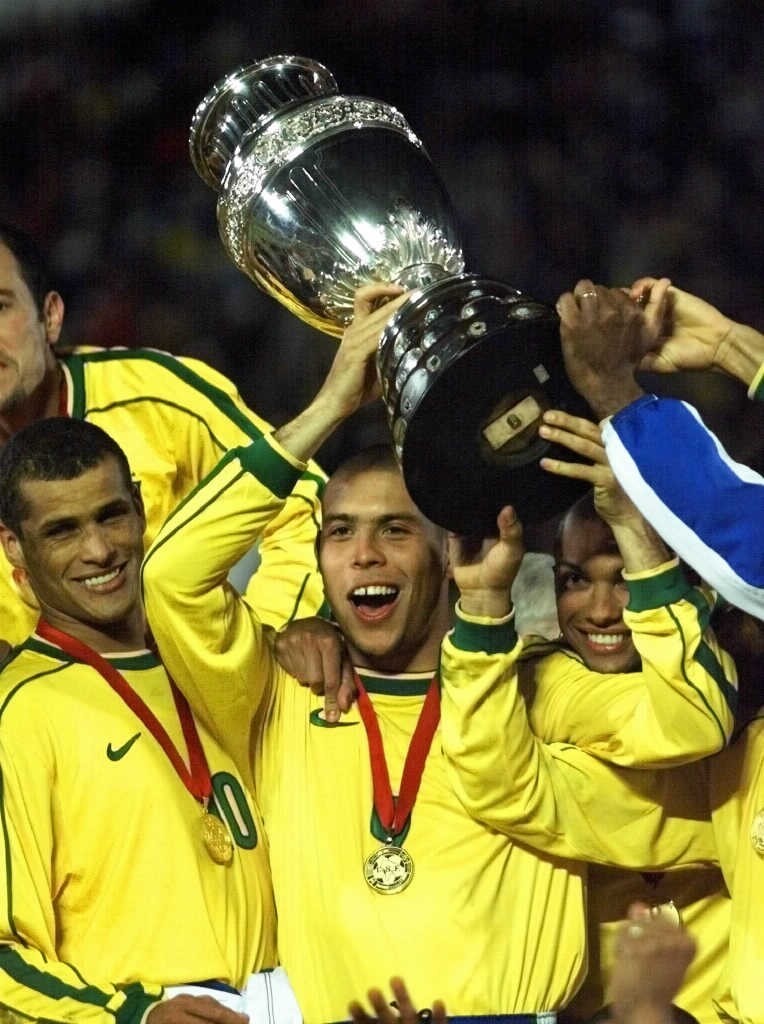
Ronaldo made his international debut for Brazil on 23 March 1994 in a friendly match in Recife against Argentina. His first senior goal for Brazil came on 4 May 1994 in a 3–0 friendly win against Iceland. He went to the 1994 FIFA World Cup in the United States aged 17, but did not play as Brazil went on to win the tournament.He stated he was “overjoyed” at the experience.
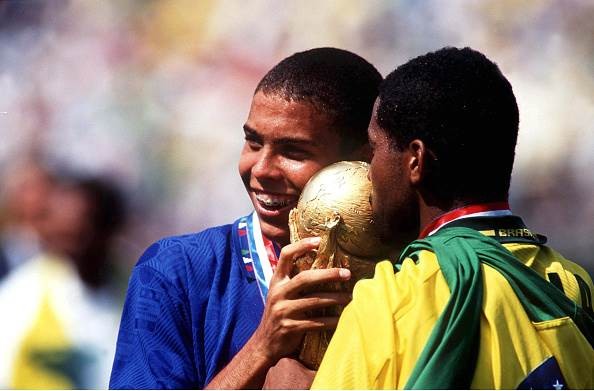
1998 FIFA World Cup
Ronaldo entered the 1998 FIFA World Cup billed as the world’s greatest player by reporters in the sport. Jacob Steinberg of The Guardian writes, “In 1998, no one was as ferociously talented as Ronaldo, whose supernatural mixture of power, pace, and skill had made him the player every child in the playground wanted to be; at the age of 21, the hopes and dreams of a nation rested on his shoulders.”
Ronaldo scored four goals and made three assists en route to the final, scoring once and assisting Bebeto’s goal in a 3–0 win against Morocco in the team’s second group stage match, netting twice in a 4–1 win against Chile in the round of 16, set–up two goals in Brazil’s 3–2 victory over Denmark in the quarter-finals, and scored once in the 1–1 draw against the Netherlands in the semi-finals, also netting Brazil’s first penalty in the 4–2 shoot–out the victory. Hours before the final against France, Ronaldo suffered a convulsive fit. At first, he was removed from the starting lineup 72 minutes before the match, and the team sheet (with Edmundo as his replacement) was submitted to the FIFA delegate. The starting lineup without Ronaldo was released to stunned world media. The BBC’s John Motson stated, “The scenes in the commentary box have been absolute mayhem and chaos.”However, shortly before kick-off, after pleading that he felt fine and requested to play, Ronaldo was reinstated by Brazil coach Mário Zagallo.
Ronaldo was the last Brazilian player out of the tunnel as the teams entered the field. During the playing of Brazil’s national anthem, the camera focused on him throughout, with Ronaldo showing little emotion. Steinberg states that Ronaldo “sleepwalked” through the final, which also saw him injured in a collision with French goalkeeper Fabien Barthez. Zagallo admitted the fears over Ronaldo affected his team psychologically and stated “For the whole of the first half I was wondering whether to take him off”, but feared a public outcry in Brazil had he done so. Brazil lost the match to hosts France 3–0. Ronaldo later reflected: “We lost the World Cup but I won another cup – my life.”
An inquest was launched in Brazil, with team doctor Lídio Toledo telling the commission “Imagine if I stopped Ronaldo playing and Brazil lost. At that moment I’d have to go and live on the North Pole.” Adrian Williams, professor of clinical neurology at Birmingham University, said that Ronaldo should not have played, that he would have been feeling the after-effects of the seizure, and “there is no way that he would have been able to perform to the best of his ability within 24 hours of his first fit – if it was his first fit.”Despite his sub-par performance in the final due to his seizure hours earlier, Ronaldo was awarded the Golden Ball as the best player of the tournament for his performances leading up to the final and finished the tournament as the joint-third highest scorer. The nature of the incident set off a trail of questions and allegations which persisted for years, with Alex Bellos writing in The Guardian,
When Ronaldo’s health scare was revealed after the match, the situation’s unique circumstances lent itself to conspiracy theories. Here was the world’s most famous sportsman, about to take part in the most important match of his career, when he suddenly, inexplicably, fell ill. Was it stress, epilepsy, or had he been drugged?”
A conspiracy surrounded Nike, the sportswear company that sponsored Ronaldo and the Brazilian national team, with some in Brazil believing the company had forced Ronaldo to play. The parliamentary inquiry was unable to find any wider conspiracy, although the Brazilian public remained unconvinced. Reporting for CNN, Don Riddell wrote, “It’s one of the great mysteries of our time: not the Loch Ness Monster, Stonehenge or the Lost City of Atlantis; it’s the case of the missing striker – not so much a whodunit, more a kind of a what the heck happened?”
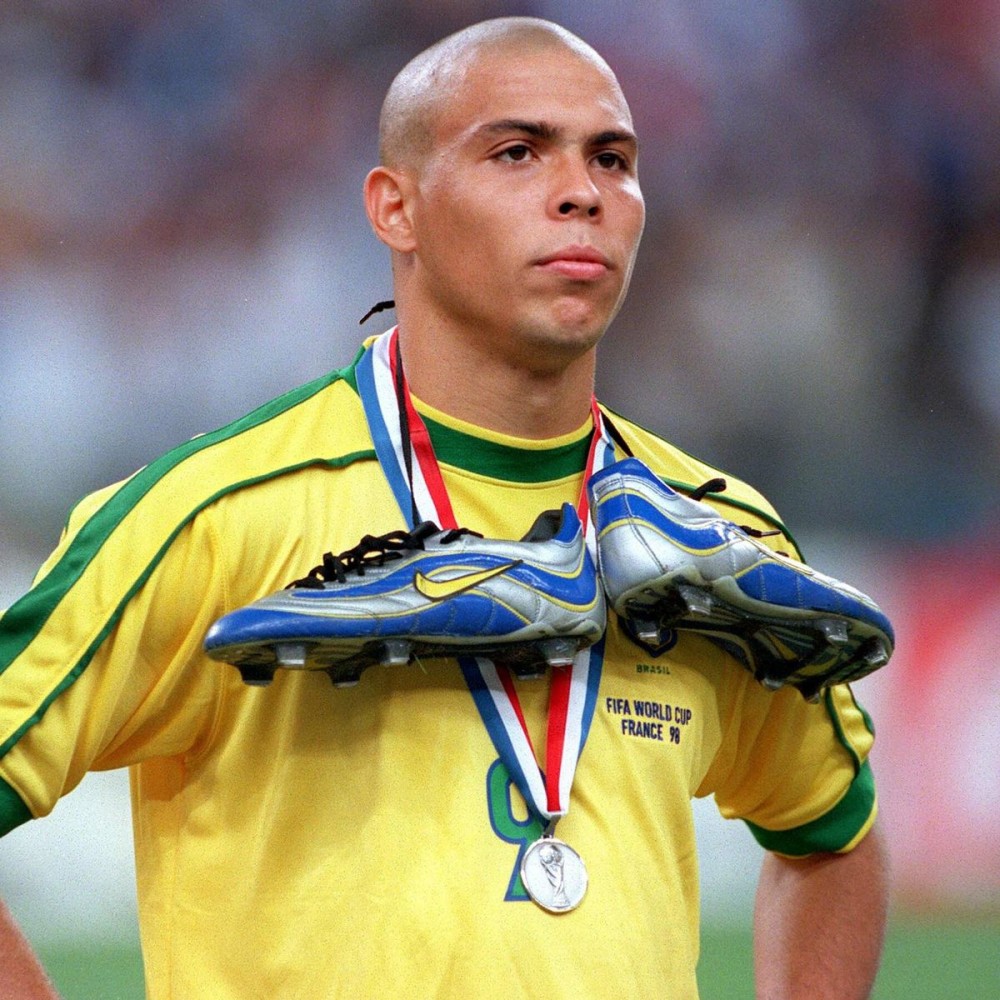
2002 FIFA World Cup
Prior to the 2002 FIFA World Cup, Ronaldo had barely played since rupturing the cruciate ligament in his right knee in April 2000, and he missed Brazil’s entire qualification campaign where, in his absence, the team had been poor. Tim Vickery writes, “Without Ronaldo, Brazil was a shambles, fortunate even to get to the tournament. With him, it was a different story.” In a remarkable comeback from injury that had threatened his career, Ronaldo led Brazil to their record fifth World Cup title, receiving the Golden Boot as the top scorer with eight goals. Many publications regarded his personal triumph as “redemption” for what occurred at the previous World Cup. Ronaldo spoke about his obsession with lifting the World Cup trophy, having missed out in 1998. “I used to visualize the trophy in front of my eyes and imagine what a wonderful feeling it must be to hold it up in the air. It was a fabulous feeling actually to hold it in my hands and kiss it.” Dubbed the “three R’s”, Ronaldo starred in a formidable attack alongside Rivaldo and Ronaldinho, and the trio was named to the FIFA World Cup All-Star Team.
Ronaldo faced several career-threatening injuries throughout his career, including a knee injury in 1999 that required multiple surgeries. However, his determination and resilience shone through as he defied the odds and made a remarkable comeback. Ronaldo’s ability to bounce back from adversity is a testament to his mental strength and unwavering passion for the game.
Ronaldo scored against every opponent in the tournament except in the quarter-finals against England. The match-winner against Turkey in the semi-final, with the winning goal a toe-poke finish with little back-lift while on the run – a finish he learned while playing futsal in his youth – the final whistle saw fans behind the goal hoist huge white letters to spell out his name, akin to the Hollywood Sign. Much attention was on his haircut – in which his head was shaved except the forelock – done as a deliberate distraction to shift media attention away from a leg injury. He revealed that “when I arrived in training with this haircut everybody stopped talking about the injury”. In the final against Germany in Yokohama, Japan, Ronaldo scored twice in Brazil’s 2–0 win and tied Pelé’s Brazilian record of 12 career World Cup goals. Ronaldo was the first player to seek out German players to offer his condolences before he was congratulated by Pelé when receiving his World Cup winners medal. Gérard Saillant, the French surgeon who operated on Ronaldo’s knee, was in the crowd as his guest, and stated after the game; “This gives hope to everyone who is injured, even those who aren’t sportsmen, to see that by fighting you can make it. He’s back to where he was; it’s hugely satisfying and I am very moved.”
Ronaldo received a number of accolades for his achievement, including the Laureus World Sports Award for Comeback of the Year and the BBC World Sport Star of the Year, and in December 2002 he dedicated his third FIFA World Player of the Year award to the medical team which helped him recover. In a 2017 interview with Fox Sports, Ronaldo stated, “The best team I played in was the Brazilian one in 2002, we felt that we could always score. It was a team without any vanity or individuals. The collective was important.
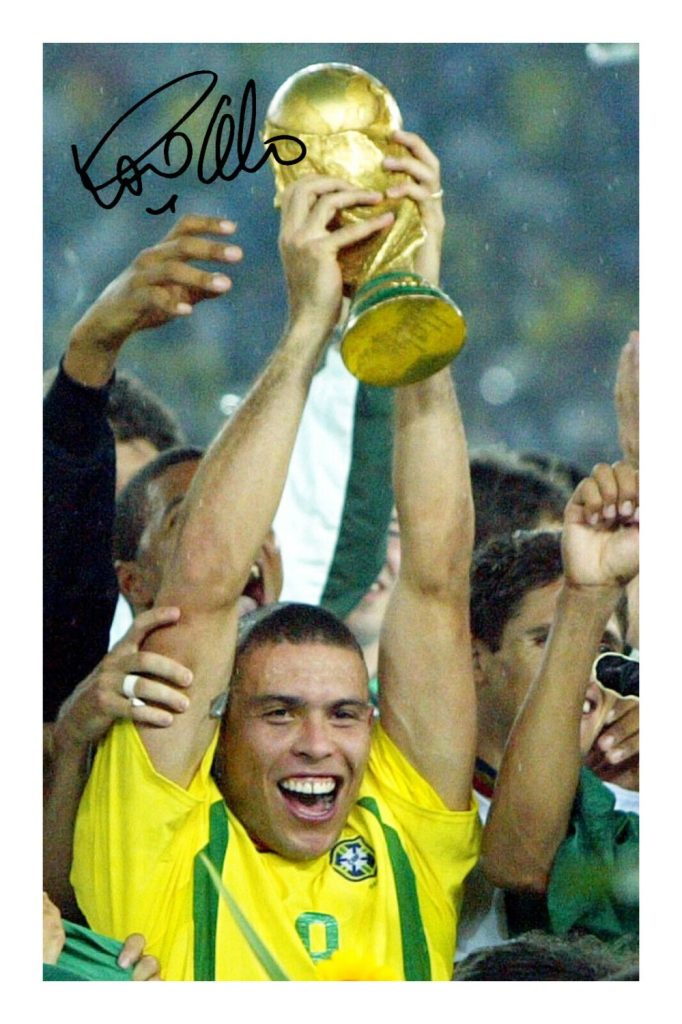
2006 FIFA World Cup
On 2 June 2004, Ronaldo scored an unusual hat-trick of penalties for Brazil against arch-rivals Argentina in a 2006 World Cup qualifying match, which put them top of the group. With 10 goals in 15 games, including a goal against Venezuela in the last game to secure first place, Ronaldo was the South American top scorer in Brazil’s qualifying campaign. Prior to the tournament, questions were asked about his weight and fitness but was declared fit for Brazil’s opening match with Croatia.
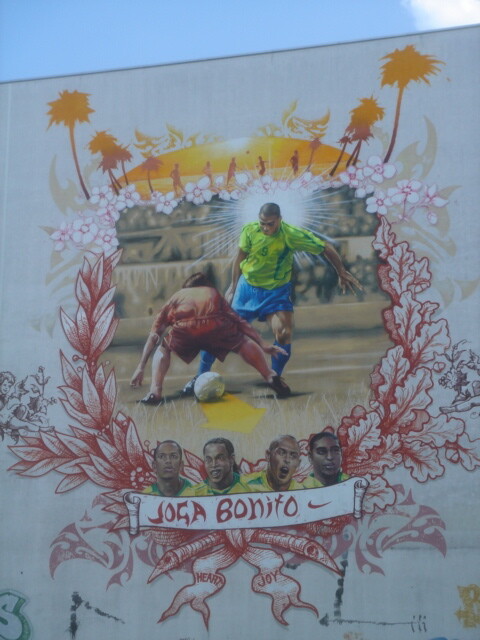
At the 2006 World Cup, Ronaldo was part of a much-publicized “magic quartet” alongside Adriano, Ronaldinho, and Kaká. The all-star Brazilian team was promoted as masters of Joga Bonito, “the beautiful game”, which was advertised by Nike before the tournament. Although Brazil won their first two group games against Croatia and Australia, Ronaldo was repeatedly jeered for being overweight and slow, but coach Carlos Alberto Parreira kept him in the starting lineup.
With two goals against Japan in the third match, Ronaldo became the 20th player to score in three World Cups and also equaled the all-time World Cup finals scoring record of fourteen, held by Gerd Müller (Ronaldo scored at France 98, Korea/Japan 2002 and Germany 2006). He then broke Müller’s record in the Round of 16 match against Ghana by scoring his fifteenth-career World Cup goal. With his third goal of the tournament, Ronaldo became only the second player ever, after Jürgen Klinsmann, to score at least three goals in each of three World Cups. Brazil, however, was knocked out by France 1–0 with a goal by striker Thierry Henry in the quarter-finals. Ronaldo was awarded the Bronze Shoe as the third-highest goal-scorer of the World Cup.
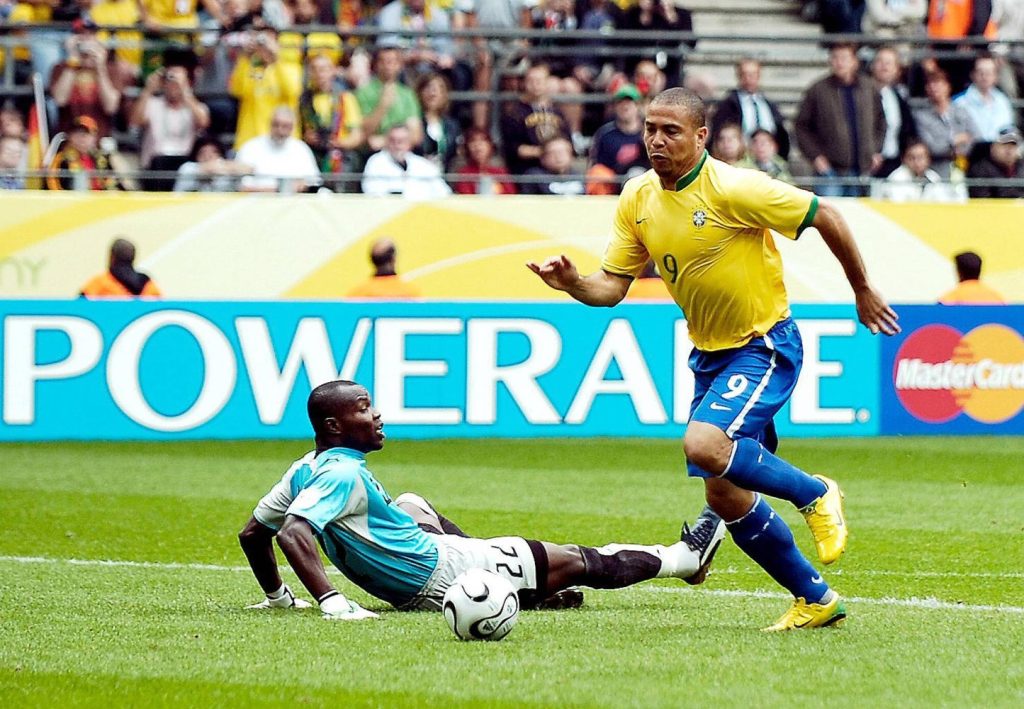
Having been listed in Guinness World Records, Ronaldo stated, “I am proud of my career and of the records I set. But I know that one day they will be broken.” Ronaldo and Klinsmann’s shared record of at least three goals in three separate World Cup finals was broken by German striker Miroslav Klose, who has a record of at least four goals in each of the three tournaments, having netted five at both the 2002 and 2006 finals, and four at the 2010 tournament. Ronaldo finished with fifteen goals in nineteen World Cup matches, for an average of 0.79 per game. His teammate Kaká reflected, “Ronaldo is the best player I have ever played with. I have seen il Fenomeno do things nobody else has ever done.”
2011: Retirement
In February 2010, Ronaldo signed a contract extension with Corinthians that would keep him with the club until the end of 2011 and said he would then retire. Commenting on his weight issues following this announcement, Brian Homewood of The Guardian states, “Sadly, Ronaldo’s celebrity is now more of a draw than his skills on the pitch – Coldplay, Israeli prime minister Shimon Peres, and actor Hugh Jackman have all visited São Paulo to get a picture with the roly‑poly star.”
In February 2011, after Corinthians were eliminated from the 2011 Copa Libertadores by the Colombian team Deportes Tolima, Ronaldo announced his retirement from football, concluding an 18-year career. In an emotional press conference on 14 February, he cited pain and hypothyroidism as the reasons for his premature retirement. He discovered he had hypothyroidism – a condition that slows down metabolism and causes weight gain – during tests with Milan in 2007. Ronaldo admitted his body had finally succumbed to the crippling litany of injuries that had blighted his career: “It’s very hard to leave something that made me so happy. Mentally I wanted to continue but I have to acknowledge that I lost to my body. The head wants to go on but the body can’t take any more. I think of an action but I can’t do it the way I want to. It’s time to go.
Ronaldo made his international debut for Brazil on 23 March 1994 in a friendly match in Recife against Argentina. His first senior goal for Brazil came on 4 May 1994 in a 3–0 friendly win against Iceland. He went to the 1994 FIFA World Cup in the United States aged 17 but did not play as Brazil went on to win the tournament. He stated he was “overjoyed” at the experience. He was then known as Ronaldinho (“little Ronaldo” in Portuguese), because Ronaldo Rodrigues de Jesus, his older teammate, was also called Ronaldo and later nicknamed Ronaldão (“big Ronaldo”) to further distinguish them. Another player, Ronaldo de Assis Moreira, now widely known as Ronaldinho, was called Ronaldinho Gaúcho when he joined the Brazil team in 1999.
Farewell match and sporadic appearances
In February 2011, it was announced that Ronaldo would be given one last match for Brazil, a friendly against Romania in São Paulo on 7 June 2011, five years after his last match with the national team. Brazilian Football Confederation official Ricardo Teixeira stated that it was fitting that his final game should take place in Brazil while representing his nation.
Ronaldo played for 15 minutes in a match that ended with a Brazilian victory with a goal from Fred. Fred celebrated his goal with Ronaldo’s famous ‘finger wag’ celebration along with his Brazilian teammates. Ronaldo was introduced after 30 minutes, partnering 19-year-old Neymar in attack, and had three shots on target which were saved by the Romanian goalkeeper. After the first half ended, Ronaldo made a farewell speech to the crowd. With 62 goals for Brazil Ronaldo retired from international football as the second-highest goalscorer for his country, behind only Pelé (Neymar has since moved into second place, with Ronaldo the third-highest scorer as of October 2020).
Ronaldo was chosen as a goodwill ambassador for the United Nations Development Programme (UNDP) in 2000 as he had the highest global appeal among sportspeople, and he accepted the role as he saw it as “an obligation” to help with causes around the world. Ronaldo played in the UNDP’s 11th Match Against Poverty on 4 March 2014 against a Zidane XI in Bern, Switzerland, with proceeds raised helping the recovery efforts in the Philippines in the wake of Typhoon Haiyan. Joined by Didier Drogba in attack, Ronaldo scored a hat-trick in the next year’s match on 21 April 2015 in St Etienne, France, with proceeds going towards the African countries most affected by the Ebola epidemic.
On 14 June 2018, Ronaldo featured at the 2018 FIFA World Cup opening ceremony held at the Luzhniki Stadium in Moscow, Russia.He walked out with a child wearing a Russia 2018 shirt at the beginning, and returned at the end of the ceremony with the official ball of the 2018 World Cup – Adidas Telstar 18 – which was sent into space with the International Space Station crew in March and came back to Earth in early June.
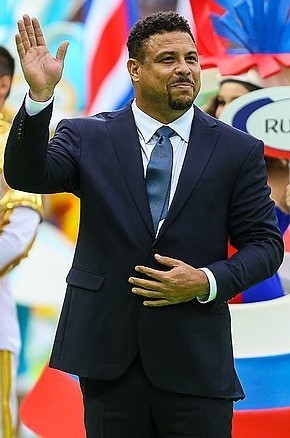
Ronaldo’s impact on the game extends beyond his playing days. He inspired a generation of footballers with his skill, versatility, and relentless pursuit of excellence. Ronaldo’s success paved the way for future Brazilian stars and solidified the nation’s reputation as the home of exceptional football talent. His influence can be seen in the playing style of many current players who strive to emulate his speed, technique, and goal-scoring prowess.
Off the field, Ronaldo has also made a significant impact through his charitable endeavors. He established the Ronaldo Nazário Foundation, which focuses on providing education and healthcare to underprivileged children. Ronaldo’s philanthropic efforts showcase his commitment to making a positive difference in the lives of others.
Ronaldo Nazário’s extraordinary talent, undeniable charisma, and remarkable achievements have solidified his status as one of football’s all-time greats. His blistering speed, exceptional skill, and clinical finishing made him a joy to watch and a nightmare for defenders. Ronaldo’s legacy will forever be etched in football history, and his influence will continue to inspire future generations of players. He truly embodies the essence of a footballing phenomenon, leaving an indelible mark on the beautiful game.
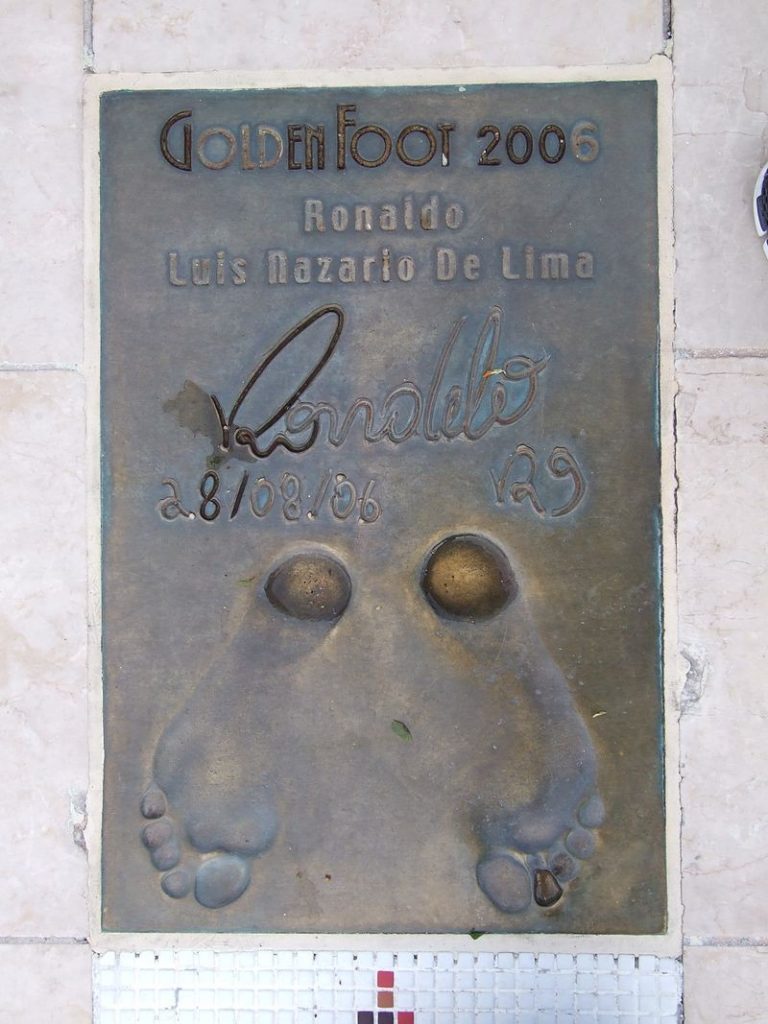
Honors
Cruzeiro:
Campeonato Mineiro: 1994
PSV:
KNVB Cup: 1995–96
Barcelona:
Supercopa de España: 1996
UEFA Cup Winners’ Cup: 1996–97
Inter Milan:
UEFA Cup: 1997–98
Coppa Italia runner-up: 1999–2000
Real Madrid:
La Liga: 2002–03, 2006–07
Supercopa de España: 2003
Intercontinental Cup: 2002
Corinthians:
Campeonato Paulista: 2009
Copa do Brasil: 2009
Brazil:
FIFA World Cup: 1994, 2002; runner-up: 1998
Copa América: 1997, 1999; runner-up: 1995
FIFA Confederations Cup: 1997
Summer Olympic Games bronze medal: 1996
Individual:
Supercopa Libertadores top scorer: 1993–94
Supercopa Libertadores Team of the Year: 1993–94
Campeonato Mineiro top scorer: 1993–94
Campeonato Mineiro Team of the Year: 1994
Eredivisie top scorer: 1994–95
FIFA World Player of the Year: 1996, 1997, 2002
Trofeo EFE La Liga Ibero-American Player of the Year: 1996–97, 2002–03
Pichichi Trophy: 1996–97, 2003–04
European Golden Shoe: 1996–97
World Soccer Magazine World Player of the Year (3): 1996, 1997, 2002
Don Balón Award La Liga Foreign Player of the Year: 1996–97
Copa América Final Most Valuable Player: 1997
Copa América Most Valuable Player: 1997
FIFA Confederations Cup Bronze Boot: 1997
FIFA Confederations Cup All-Star Team: 1997
UEFA Cup Winners’ Cup Final Most Valuable Player: 1997
Copa América All-Star Team: 1997, 1999
IFFHS World’s Top Goal Scorer of the Year: 1997
Bravo Award: 1997, 1998
Onze d’Or: 1997, 2002
Ballon d’Or: 1997, 2002
UNICEF European Footballer of the Season: 1996–97
European Sports Media ESM Team of the Year: 1996–97, 1997–98
FIFA XI: 1997, 1998
Serie A Footballer of the Year: 1998
Serie A Foreign Footballer of the Year: 1998
UEFA Cup Final Most Valuable Player: 1998
UEFA Club Footballer of the Year: 1997–98
UEFA Club Best Forward: 1997–98
FIFA World Cup Golden Ball: 1998
FIFA World Cup All-Star Team: 1998, 2002
FIFA World Cup top assist provider: 1998
Inter Milan Player of the Year: 1998
FIFA World Cup Golden Shoe: 2002
FIFA World Cup Silver Ball: 2002
FIFA World Cup Final Most Valuable Player: 2002
Intercontinental Cup Most Valuable Player: 2002
UEFA Team of the Year: 2002
BBC World Sport Star of the Year: 2002
Laureus World Sports Awards Comeback of the Year: 2003
Best Male Soccer Player ESPY Award: 2003
FIFA 100 (2004)
FIFA World Cup Bronze Boot: 2006
Brazilian Football Museum Hall of Fame: 2006
Golden Foot Award: 2006
France Football magazine’s all-time starting XI: 2007
Association of Football Statisticians (AFS) Top-100 Players of All Time: 2007. #2
Sports Illustrated Team of the Decade: 2009
Real Madrid Hall of Fame
Marca Leyenda: 2011
L’Équipe’s top 50 South-American footballers in history: #5
Italian Football Hall of Fame: 2015
International Federation of Football History & Statistics (IFFHS) Legends
Inter Milan Hall of Fame: 2018
Globe Soccer Awards Player Career Award: 2018
Ballon d’Or Dream Team: 2020
IFFHS All-time Men’s B Dream Team: 2021

